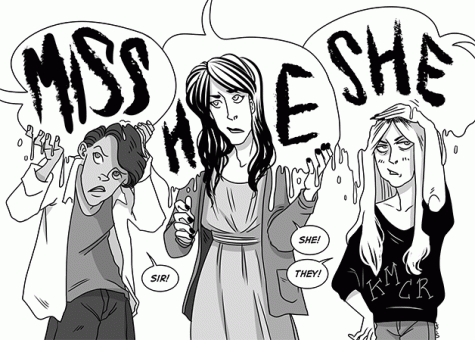All gender identities must feel welcome at Loyola
March 5, 2015
Disclaimer: Our editorial board recognizes our privilege in covering this subject — none of us are transgender, but we are luckily in a position where we can hear the issues that matter to our student body and advocate on behalf of transgender and non-binary identifying students. Regardless of our respective gender identities, we believe it our obligation to do so because of our platform
Editor’s note: Caitlyn Jenner publicly transitioned since this story went to print — this article has been updated to remove mentions of her prior to coming out.
It is an extremely lucrative time for the media to be covering transgender rights. Transgender-related stories are popular, thanks to television shows like “Transparent” and “Orange is the New Black” and stars like Laverne Cox.
However, these stories should not be published as quick ways to sell newspapers and magazines. Sometimes media coverage is bad and comes as a result of miseducation or an altogether lack thereof.
In the case of the NOLA.com | The Times-Picayune’s initial coverage of the death of transgender woman Penny Proud, the author repeatedly misgendered Proud by referring to her with masculine pronouns. While we can assume that this was not an intentional act, it is but one example of the many trans men and women who are mispronouned in news coverage and their obituaries, which often reads as a final attack on a segment of the population that has continually been marginalized and misunderstood.
The point of increased coverage should be to raise awareness about identity, to create an open conversation, remove stigmas from discussing transgender related subjects and to educate people about the logistics of gender identity.
The problem is that, unfortunately, sometimes media outlets are not concerned with what is ethical. The problem is that most often, they are concerned with what is profitable, quick and easy to publish. As a result, education takes a backseat to exploitation.
But this is where Loyola comes in.
Luckily, we go to a school that fosters conversation about a variety of human rights violations. Our university encourages us to think critically and actively about how to fix them.
As a result, Loyola should educate its student body about how to properly address and discuss what it is to be transgender and non-binary conforming and create an environment on campus that builds these people up so that its students can effectively work toward the construction of a safe and welcoming campus — and a safe and welcoming world — for all.
Don’t read this the wrong way — Loyola is an incredibly open-minded and welcoming institution when it comes to gender and sexual orientation, especially when compared to other Christian universities in the South, such as Erskine College in South Carolina who recently publicly denounced homosexuality.
However, just because we are not in high waters in these respects does not mean that there is no room on our campus for improvement
We already have unisex bathrooms in Monroe Hall, which is a big step in the right direction. However, these bathrooms should exist in all buildings. Tulane recently declared that all single-occupancy restrooms in the Lavin-Bernick Center — the rought equivalent to our Danna Center — are now to be regarded as “All Gender” bathrooms.
To cisgender students, faculty, staff and visitors, gendered bathrooms may not even register as an obstruction of justice, but to transgender and non-gender conforming students, faculty, staff and visitors, these restrooms represent an impossible demand.
Having residential halls and dorms that are separated by gender marginalizes students whose gender identity does not neatly and compactly fit into the two default genders available to select from. While single rooms are available on campus, this solution seems like a way to push an uncomfortable and system-disrupting situation out of sight until an easier way to deal with it comes to mind.
This approach is wrong — it presumes that the system does not need to adapt to the needs of students and that students must be alienated in order to conform to the present system.
Continuing to not talk about this subject does harm. It does nothing to educate Loyola students about proper and potential pronoun preference and it does nothing to eliminate the prejudices and stigmas that surround non-binary conforming genders.
Above all else, it implies that this issue is not worth mainstream attention, and it reaffirms that the mainstream media attention it does receive is correct, unquestionable and enough.
We applaud clubs on Loyola’s campus like Student Advocates for Gender Equality and the Gender and Sexuality Society for fostering conversations about these topics and issues, but their outreach is limited to a student population that is already willing and eager to unpack these subjects. For this reason, change necessitates administrative support and action.
The struggle for transgender rights is one of the most pressing social justice issues of our time and we suggest that Loyola treats it as such.









Aoife Assumpta Hart • Mar 6, 2015 at 8:40 pm
Misgendering isn’t fun; but it’s not the Thunderdome. I mean, this makes all of us transwomen (which I am) look like we’re emotional piñata.
“Disclaimer: Our editorial board recognizes our privilege in covering this subject — none of us are transgender . . .”
There’s almost a script now for liberal public litanies of ‘privilege’ airing. It’s a nightmare of false nobility.